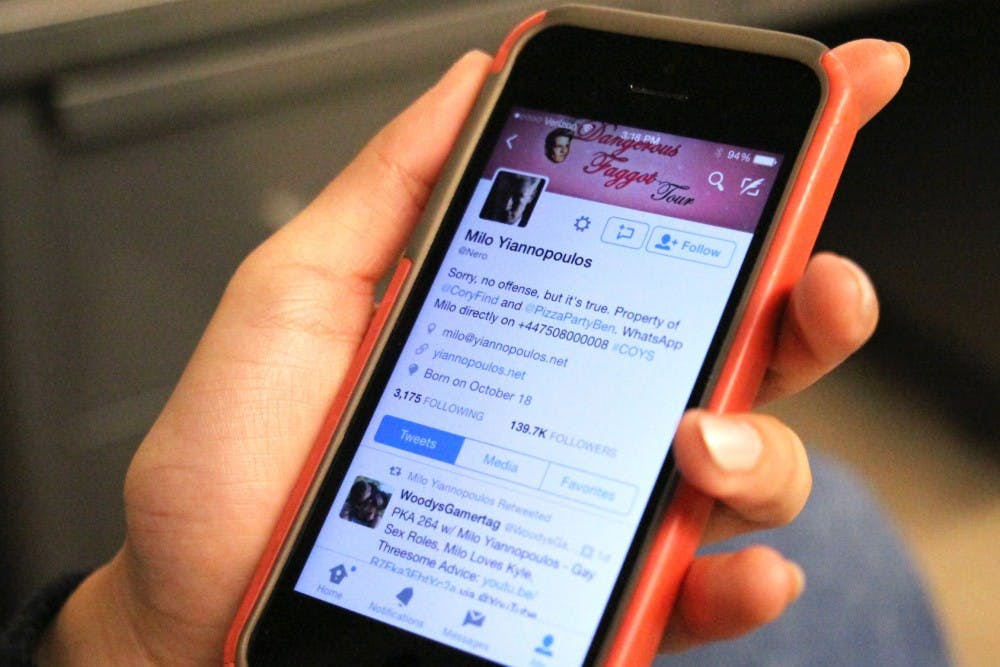Who is Milo Yiannopoulos?
Before last Friday, the answer to that question was fairly straightforward: Milo Yiannopoulis is the Greek-born, British, gay, Catholic, conservative Technology Editor for the American news site breibart.com. He is best known for his coverage of the Gamergate controversy, in which he was critical of both unethical journalism and what he calls “quantum superstate feminism.” He spends a great deal of his time making provocative statements on Twitter, namely accusing feminists of being both victims and aggressors at the same time. He goes by the handle @Nero (the name of the ancient Roman Emperor).
But those were simpler times. Now, anyone can be Milo Yiannopoulos. Even you.
Damn shame Support un-verified @nero because now there's no way I can tell who's the real one. #jesuismilo pic.twitter.com/YY4ujYWAqa
— The Cringe Channel (@cringe_channel) January 9, 2016
So why are there so many accounts with Yiannopoulos's name?
Twitter verifies the authenticity of accounts held by public figures by placing a blue checkmark next to their names. Authenticating Twitter accounts is important because it allows popular users to maintain control over their own reputations. Being somewhat of a celebrity, Yiannopoulos had a checkmark. Until Friday, that is.
I've been sat on the naughty table! pic.twitter.com/2ppJ3X4J62
— Milo Yiannopoulos (@Nero) January 8, 2016
As for what specific infraction caused Yiannopoulos’s badge to be removed, no one outside of Twitter’s ranks really knows. The most plausible explanation is that the move is the result of a feminist named Catrin Cooper publicly asking Twitter co-founder and CEO Jack Dorsey to “do something” about Yiannopoulos’s account.
.@Support, @Jack,
How many more women does this guy's account need to target before you do something? pic.twitter.com/ytinO5nXUK
— Catrin (@catrincooper) January 7, 2016
In response to Twitter's decision to revoke Yiannopoulos's checkmark, many Twitter users decided to change their names to "Milo Yiannopoulos" and use pictures of Yiannopoulos as their avatars, proving the importance of Twitter's verification system as a way to prevent impostors from impersonating famous people.
The protesters used the hashtag #JeSuisMilo (which translates to "I am Milo"), a nod to the victims of the 2015 "Charlie Hebdo" shooting.
The way I see it, Yiannopoulos's punishment doesn't fit his crime. It's understood among Twitter users that a checkmark means that the account it adorns is confirmed to be real. It has nothing to do with whether the user has been following Twitter's rules. Removing the badge for breaking a rule would be like ASU taking a student's ID away for riding a bike in a Walk Only Zone. It just doesn't make sense.
Of course, Twitter is a private company, and is free to do what it likes with its own website, but I don't think Twitter handled the situation correctly.
If Yiannopoulos did, in fact, violate Twitter's rules, the company should have identified exactly which rule he broke, and what he did to break it. A more reasonable course of action would have been to suspend Yiannopoulos's account for an amount of time appropriate for the seriousness of his rule-breaking.
I understand that Twitter needs to find a balance between safety and free speech, but in this case they were too far on the side of protecting people's feelings.
Reach the columnist at cmfitzpa@asu.edu or follow @CodyFitzStories on Twitter.
Editor’s note: The opinions presented in this column are the author’s and do not imply any endorsement from The State Press or its editors.
Want to join the conversation? Send an email to opiniondesk.statepress@gmail.com. Keep letters under 300 words and be sure to include your university affiliation. Anonymity will not be granted.
Like The State Press on Facebook and follow @statepress on Twitter.




